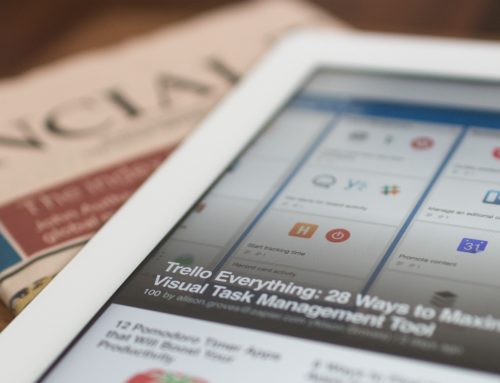Tradition and Fear. Both are pretty powerful motivators, but both are poor reasons for making marketing decisions.
Last year I sat down with a small business client to take a look at their existing marketing plan, with an eye toward helping them jump into the world of social media. Their marketing budget was very lean, but one line item in particular gave me the jitters.
They were spending nearly $1,000 a month on Yellow Pages advertising, with fairly large listings in three different categories.
What astounded me even more was not that they couldn’t prove these ads brought them any business, but that they actually had proof that they got no business from them! That’s right: every new customer had to fill out a form that included a space to explain how they heard about the business.
Not a single person in two years had listed the Yellow Pages. Not. One.
And at the rate they were spending, they would have to get at least 80 new clients each year in order to just break even.
So that led me to two more questions:
- If it wasn’t the Yellow Pages, what was it that was bringing new clients their way?
- If you can point to even one customer who is tied to the Yellow Pages, why are you spending so much??
I was pretty sure I knew the answers I would get to these questions, and I was right.
Nearly 95% came as the result of referrals, and in most cases they even knew the name of the customer who had given the referral. That’s incredibly valuable information. The second most popular answer (at fewer than 5%) was something like: “we drive by your place all the time and always thought it looked nice, and now we need your services.”
No surprise. Like most businesses, this particular business saw most of its new traffic coming from word of mouth and referrals.
Now, WHY were they still spending so much money on the Yellow Pages?
- It’s what we’ve always done; and
- If we stop, our competitors will still be there without us.
So, they were spending nearly $12,000 a year on something they were pretty sure didn’t work because of … tradition and fear.
Tradition can be a powerful branding and marketing tool, but we should never do something just because “that’s the way it’s always been done.” There has to be more of a reason. Does it work? If not, kiss it goodbye.
And then there’s fear. Fear often prevents us from trying something new. But sometimes it also makes us hold on to things that we need to get rid of.
If you walk away from the Yellow Pages, don’t look back. Don’t second guess. If you’re worried that your competitors are still there when you aren’t, remember: it wasn’t working for you. Odds are, it isn’t working for them. So let THEM stay there and waste their money. Just because you aren’t using a particular advertising or marketing venue when they are, it doesn’t mean you are missing an opportunity.
Do your research. Find out what does and what doesn’t work for you. Then determine the best way to move forward. Yes, the Yellow Pages might still work well for certain business categories and customer bases. But don’t make the decision based on things like fear and tradition.
My clients? They are now saving quite a bit of money by not giving in to fear and tradition. They have greatly reduced their Yellow Pages spending and are using just a portion of that money to build a strong social media presence that not only provides with great content, but gives their existing customer base some powerful tools for word of mouth.
Are fear and tradition crippling your business and marketing decisions?
Image: ia7mad via Flickr, CC 2.0


![[EVENT]: PR Hacks for Small Biz (online)](https://shonaliburke.com/wp-content/uploads/2021/06/FB-Ad-1200x800-01-01-01-Copy-500x383.jpeg)








[…] This post was originally presented as a guest post over at Waxing Unlyrical, my friend Shonali Burke’s blog, back in May. […]
[…] Tradition or Fear: Which Drives Your Marketing? (waxingunlyrical.com) […]
[…] Tradition or Fear: Which Drives Your Marketing? (waxingunlyrical.com) […]
[…] Tradition or Fear: Which Drives Your Marketing? (waxingunlyrical.com) […]
[…] even if they seem a bit…unpalatable? Different? Unknown? Sadly, a lot of our marketing is driven by fear and tradition. Are you stuck in a routine of “but this is how we’ve always done it”? Does fear […]
@Shonali @Sunnnee Sometimes I wonder myself. I think I get that way with age. I am 41 and been there done that! Thanks for the reply Shonali!
@Sunnnee I love this bit: “what you focus on determines your reality.” Is there a philosopher hiding in you? :p
This was a great post! I remember working for a few service companies that do this on a monthly basis. It’s amazing how some people or companies feel as if they are going to be left behind when they clearly know they are “wasting” money. Makes you feel like you need to pip slap them over the head to make sense of it all. Fear will cripple you if you allow it too. What you focus on determines your reality.
@KenMueller @AnnieAndreHacks In a pinch I’ll use the Yellow Pages – sometimes it can be very difficult to find emergency information online, e.g. when I’ve had a plumbing emergency, or something. That’s when it’s been useful. Now, of course, I have a list of service providers I rely on and I also get recommendations from my local listserve. I used to do Angie’s List, but I haven’t use that in ages and am thinking of canceling it.
I’d like to follow him if you don’t mind sharing his name. I’m always interested to see what is working for others.
@ShakirahDawud I think we’ll see less and less of people being tied to “the way we’ve always done it” as younger people move into the work force.
@bdorman264 I have a friend here locally who is in the insurance business and his company does a great job with an interesting mix of Social Media and traditional media. In particular, he’s done pretty well for himself on Twitter, merely by being himself and being a part of the local Twitter community.
Hey Ken, interesting post. I’m in commercial insurance and 99% of our customers are people we seek out. If they are just making a random call to our office there are usually some problems associated with the account. Because of this, we decided to stop advertising in the yellow pages whatsoever. Some people panicked. Up until the economy took our legs out from under, we had double digit growth year after year; the yellow pages had no impact whatsoever.
As I get knee deep in social media and develop a strategy for us corporately; I’m sure we will get much more visibility, name recognition, etc with this more cost effective method.
Good to see you, buddy.
Good points about tradition, which is almost always coupled by fear when results don’t materialize. It’s a potent brew, and one I hope not to get hung up on myself as we create the “new tradition” of social media marketing strategies.
@AnnieAndreHacks The Yellow Pages are still important to some business categories and to some audiences. My parents and in-laws are in their 70s and 80s and they will use the Yellow Pages before they use the Internet. Well, my in-laws don’t have a computer, so that’s not an option. Clearly age is one of the biggest factors in Yellow Pages usage. I know Verizon, at least around here, is going to stop printing the White Pages. People go online to find out that kind of info as well. As more people get online, and the older demographics disappear, we will see some serious changes in how we use things like the Yellow pages
This is a little off topic but the other day my husband and i were talking about the fact that San Francisco is banning the yellow pages. My reaction was Oh FINALLY but my husband is ehem, kind of old school thought it was down right silly.
From my point of view, i know absolutely no one who uses the yellow pages for anything other than as a doorstop and to press and dry flowers. Or sometimes use it as a booster seat for my daughter.
My husbands point of view was that there are still (some) people who use it. Although he didn’t use it himself and doesn’t know anyone who uses it.
His rational baffled me. But now i think it must be deep rooted in tradition. It must be a powerful thing.. :)